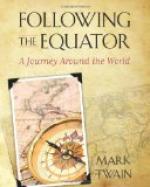Mr. Bonwick says that Robinson’s friendly capture of the Big River tribe remember, it was a whole tribe—“was by far the grandest feature of the war, and the crowning glory of his efforts.” The word “war” was not well chosen, and is misleading. There was war still, but only the Blacks were conducting it—the Whites were holding off until Robinson could give his scheme a fair trial. I think that we are to understand that the friendly capture of that tribe was by far the most important thing, the highest in value, that happened during the whole thirty years of truceless hostilities; that it was a decisive thing, a peaceful Waterloo, the surrender of the native Napoleon and his dreaded forces, the happy ending of the long strife. For “that tribe was the terror of the colony,” its chief “the Black Douglas of Bush households.”
Robinson knew that these formidable people were lurking somewhere, in some remote corner of the hideous regions just described, and he and his unarmed little party started on a tedious and perilous hunt for them. At last, “there, under the shadows of the Frenchman’s Cap, whose grim cone rose five thousand feet in the uninhabited westward interior,” they were found. It was a serious moment. Robinson himself believed, for once, that his mission, successful until now, was to end here in failure, and that his own death-hour had struck.
The redoubtable chief stood in menacing attitude, with his eighteen-foot spear poised; his warriors stood massed at his back, armed for battle, their faces eloquent with their long-cherished loathing for white men. “They rattled their spears and shouted their war-cry.” Their women were back of them, laden with supplies of weapons, and keeping their 150 eager dogs quiet until the chief should give the signal to fall on.
“I think we shall soon be in the resurrection,” whispered a member of Robinson’s little party.
“I think we shall,” answered Robinson; then plucked up heart and began his persuasions—in the tribe’s own dialect, which surprised and pleased the chief. Presently there was an interruption by the chief:
“Who are you?”
“We are gentlemen.”
“Where are your guns?”
“We have none.”
The warrior was astonished.
“Where your little guns?” (pistols).
“We have none.”
A few minutes passed—in by-play—suspense—discussion among the tribesmen—Robinson’s tamed squaws ventured to cross the line and begin persuasions upon the wild squaws. Then the chief stepped back “to confer with the old women—the real arbiters of savage war.” Mr. Bonwick continues:




